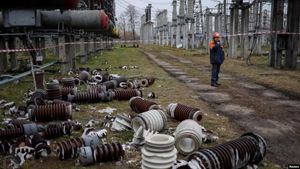Bangladesh is currently engulfed in political turmoil as protesters have taken to the streets, voicing their outrage against the recently ousted Prime Minister Sheikh Hasina. The protests have intensified, leading to clashes between rival political factions, with significant fallout across the country.
On August 5, Hasina was overthrown after 15 years of rule, leading to the establishment of an interim government under Nobel laureate Muhammad Yunus. The political shift has incited protests from activists and supporters of Hasina's Awami League, who feel marginalized by the new government.
On Thursday, hundreds of student protesters attacked supporters of Hasina, using bamboo sticks and iron rods to block access to the Bangabandhu Memorial Museum. The site, dedicated to independence leader Sheikh Mujibur Rahman—Hasina's father—had been the focal point of this recent wave of protests.
The protesters targeted Hasina's supporters as they attempted to reach the museum, commemorative activities planned for Rahman's death anniversary. Similar events had previously drawn large crowds, making the site something of a gathering point for Awami League supporters.
Hasina, who has fled to India, appealed to her supporters via social media to pay their respects to her father on the anniversary of his assassination. Previously, this date was marked as National Mourning Day under her administration, but this observance has been canceled by the interim government.
Witnesses noted the chaotic scene as the protesting groups manhandled several individuals seeking to honor Rahman. Journalists covering the situation reported harassment, including threats and forced deletions of footage on-site.
Another group of protesters voiced their presence by chanting Islamic slogans as they surged through the streets leading to the museum, which was previously set ablaze during the anti-government actions. This show of force highlights the divisions within Bangladeshi society and the deep-rooted tensions from the political upheaval.
A prominent actress was among those targeted, attacked as she attempted to light candles at the museum. The protesters celebrated their perceived victory by holding parties, blasting music, and spreading videos of their actions on social media, drawing national attention.
The protesters justified their actions, stating they aimed to prevent any potential chaos from Hasina's followers trying to commemorate Rahman. Sarjis Alam, one of the rally leaders, noted their determination to continue demanding justice against Hasina and her administration.
Feeling emboldened, the protesting groups declared their commitment to trial Hasina and others for their alleged roles during the weeks of violent protests. This call for justice stems from widespread allegations of state-sponsored violence and repression during Hasina’s tenure.
Reports suggest more than 300 lives were lost during the unrest initiated by initial protests against government job quotas. What began as opposition to perceived inequalities soon transformed, fueled by growing resentment toward Hasina's increasingly authoritarian rule.
With no police presence noted during the protests, chaos reigned across Dhaka as activists expressed their discontent with the transition of power. Observers commented on how the former victims of past political violence now appeared as perpetrators amid the protests.
Key news outlets highlighted struggles faced by their journalists trying to report on the situation. Mujib Mashal of The New York Times remarked on the wild atmosphere, stating it felt like “complete mob rule,” reflecting the abrupt power dynamics at play.
Among the interim government's governing body, the possibility of political stability rests on their ability to engage discontented citizens and mend deep divisions. Discussions led by Yunus with prominent parties, including the Bangladesh Nationalist Party (BNP), focused on establishing the groundwork for fair elections.
The BNP and other political factions proposed allowing the interim government time to create conditions for free elections. Meetings at the state guest house Jamuna saw various parties, including Jamaat, discussing reforms and how to address public discontent.
BNP Secretary General Mirza Fakhrul Islam Alamgir expressed his party's willingness to support all activities of Yunus’ government but did not specify any timeline for upcoming elections. This open-ended statement reflects the cautious optimism surrounding the interim regime, paving the way for future cooperation.
Jamaat's leader underscored the need for dialogue around national issues rather than intra-party dynamics. The discourse on creating stability has become urgent as citizens await any signs of progress from the interim leadership.
Political agents reiterated the need for reform within the governing infrastructure, including changes to local administrations and the Election Commission. They collectively expressed their hope for responsible governance and effective conflict resolution under the new administration.
Andaleeve Rahman Partho of the Bangladesh Jatiya Party noted the depth of the challenges facing this government, which came to power after the ousting of the Awami League. He conveyed the party's commitment to supporting any positive initiatives taken by the interim government.
Much of the focus during deliberations centered around the decision to keep August 15 as National Mourning Day. Many progressive elements argue the commemoration should be abolished, believing it contradicts the spirit of independence restored during the recent marches.
Opposition members have publicly argued against observing this day, describing it as the continuation of antiquated practices from previous regimes. Supporters of the remnants of Hasina’s government see such proposals as attacks on their history and the legacy of independence.
The newly inaugurated administration must now navigate these politically charged discussions as it attempts to establish authority amid growing unrest. Observers from various political factions have begun to question the direction of the Yunus-led interim government, anxious about how it might stabilize the near-term future.
While the protests continue, the scrutiny of the state’s handling of dissent and media freedom remains high. Commentators worry the incidents faced by journalists symbolize broader trends toward oppression during times of civil unrest.
Moving forward, it will be imperative for the interim government to balance its authority with the demands of various political groups and the general populace. If Yunus and his cabinet can manage to tread carefully, Bangladesh might see the dawn of renewed enlightenment within its political sphere.
This political crisis marks one of the most significant upheavals Bangladesh has faced since its independence. The outcome of these events will likely resonate on multiple fronts, impacting politics, governance, and civil rights.
Dhaka remains at the heart of this brewing storm, as citizens exercise their rights to protest, voice their discontent, and demand change. The coming weeks and months will be telling as this interim government seeks to strike the delicate balance between authority and liberty amid the challenges it has inherited.
Only time will reveal the resilience of Bangladesh's political architecture and the people's capacity for unity amid chaos. How the interim government addresses its myriad challenges will shape the nation’s future.



